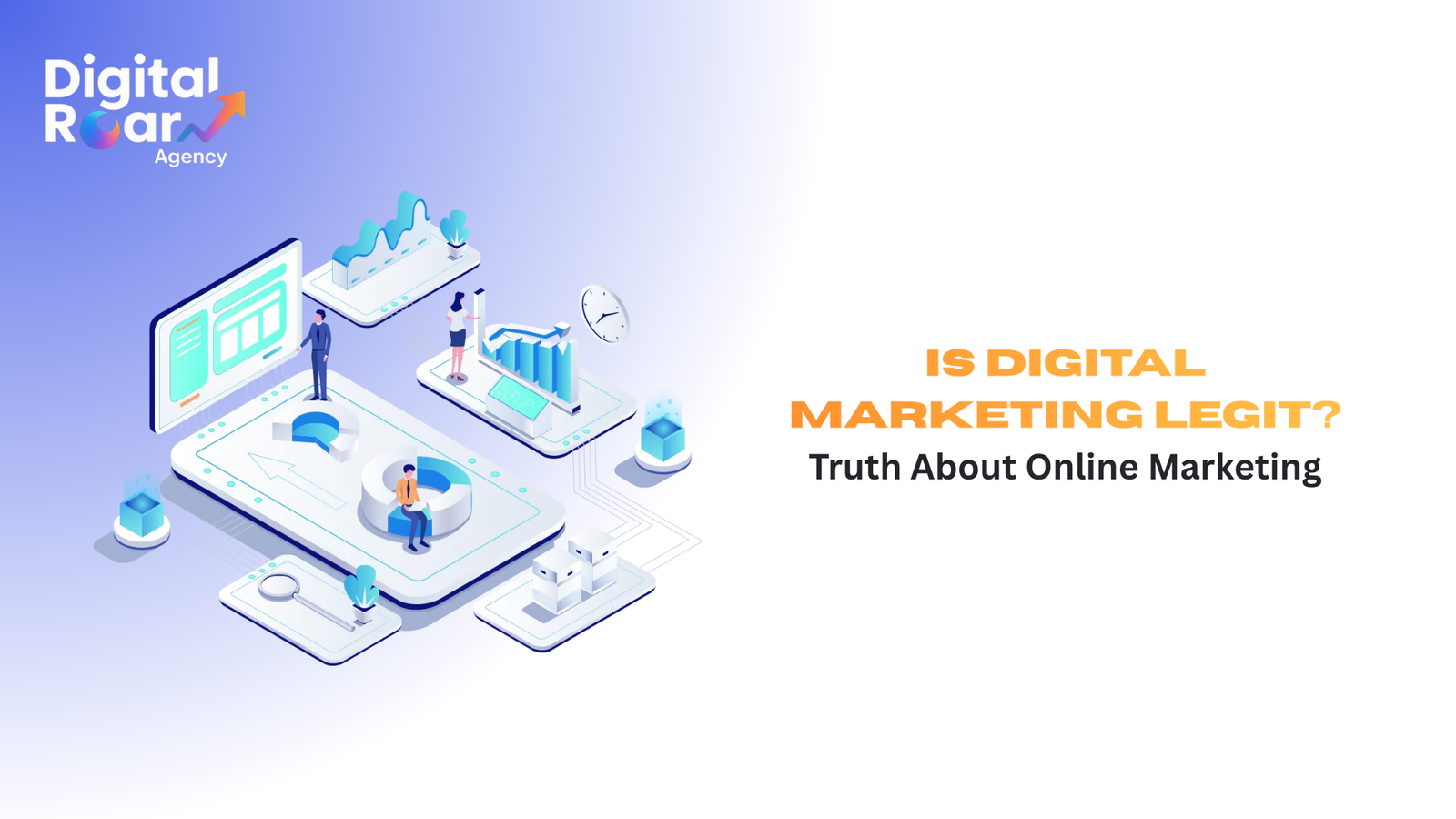Table of Contents
Introduction
Is digital marketing legit? It is a question that most business owners and professionals will ask when they encounter aggressive assertions of easy money on the internet. You have likely seen advertisements that claim to achieve immediate success through SEO, social media, or Google Ads but are they effective digital advertising techniques or are they a scam?
The reality is that digital marketing is a legitimate business strategy, which is misunderstood. In this article we are going to reveal the truth, why there are those individuals who believe it to be a scam and how to distinguish between the actual digital marketing strategies and the frenzy.
What Exactly is Digital Marketing?
Digital marketing refers to the act of advertising products or services using online platforms and avenues. It encompasses a broad scope of activities including search engine optimization (SEO), pay-per-click (PPC) advertising, social media marketing, email campaigns, and content marketing.
In contrast to traditional advertising, legit digital marketing tactics enable businesses to find a global customer base instantaneously, monitor each impingement or appropriation, and extend campaigns economically. This is why it is not only a buzzword but also a vital component of the contemporary business development.
Why Do People Doubt Digital Marketing?
Unrealistic Promises
The unrealistic promises of scammers and so-called fake gurus are one of the primary causes of digital marketing gets a bad reputation. They tend to promote overnight success, passive income or guaranteed viral traffic.
Fake Agencies and Gurus
False digital marketing agencies or so-called professionals receive high fees but do not yield much or even nothing. Companies that are victimized by such services usually end up feeling that the whole online marketing industry is a fraud.
Lack of Understanding
A lot of business owners do not understand how digital advertising works. They want quick outcomes without understanding that it takes time to establish authority by using SEO or creating communities on social media.
Bad Experiences
Bad reporting, black-hat SEO, unauthentic followers, or misrepresenting ad metrics are all causes of mistrust. Such shady practices build the wrong perception that digital marketing is not legit, yet the issue is on execution.

Why Digital Marketing Is Legitimate
Trusted by Global Brands
The leading companies such as Amazon, Netflix, and Nike are highly dependent on digital marketing strategies to sell and create awareness. Their success is an attestation that online marketing is legit when it is performed correctly.
Proven ROI
By 2024, the digital ad spending had surpassed 600 billion across the globe (Statista). Companies would not keep on investing on this scale unless digital marketing didn’t work.
Transparent and Measurable
Businesses can measure impressions, clicks, conversions, and customer journeys with tools such as Google Analytics. Such transparency makes legit digital advertising more credible than the conventional billboards or TV advertisements.
Career Growth and Education
The rise of certification and career prospects in digital marketing jobs is another testament to its legitimacy. Data shows thousands of SEO experts, PPC managers, and content strategists working around the globe.
How Digital Marketing Helps Businesses
Cost-Effectiveness
Digital marketing services are cheap as compared to conventional advertisements. Small Businesses can begin with small budgets in Google Ads or Facebook marketing and grow.
Precision Targeting
Through online platforms, it is possible to target by demographics, interests, and even browsing behavior. This makes sure that money is used effectively and that the outcomes are maximized.
Scalability and Flexibility
Digital marketing strategies can expand as your business expands, whether locally or internationally.
Building Credibility
High online presence creates trust. Regular blogging, professional websites and interactive social media marketing enhance credibility and customer loyalty.
Red Flags to Identify Scams
Unrealistic Guarantees
Any agency promising an immediate outcome, like number one position in Google within a week, is most probably a scam. SEO and content marketing are long term strategies.
Lack of Transparency
When a provider is unwilling to tell you where your money goes or how the campaigns are run, it is a huge red flag. Legitimate agencies report in detail.
Use of Unethical Practices
Some marketers use black-hat tactics such as spammy backlinks, key-word stuffing or purchasing false followers. Such approaches can only provide temporary outcomes but tend to harm the business in the long term.
Absence of Case Studies or Reviews
Credible agencies will highlight customer reviews and successful cases. When you are unable to confirm their credibility, be careful.
Qualities of a Legitimate Agency
Realistic Expectations
Real agencies will make realistic targets and clarify that success will take time and effort.
Transparent Reporting
Legit providers provide access to all campaign data, which means that you are in control of how your budget is being spent.
Ethical Methods
White hat SEO activities, genuine social interaction, and ad policy adherence are evidence of professionalism and integrity.
Proven Track Record
Find agencies whose portfolios or case studies or client references show that they can produce actual results.
What It Really Takes to Succeed
Success in digital marketing takes time, effort and patience. SEO campaigns can require three to six months to work, whereas growing a social media should be an ongoing activity. Paid advertisements may provide quick traffic, yet will require constant optimization.
Companies should also dedicate adequate budgets, do A/B tests and change strategies according to the changing algorithms and market trends. Concisely, digital marketing is not a fast solution, but a long-term investment.
Myths vs. Reality
Myth: Digital Marketing is a Scam
Reality: It is an established industry that all major brands in the world use.
Myth: More Followers Equal Success
Reality: Engagement, conversions, and customer loyalty are much more significant than vanity metrics.
Myth: Anyone Can Do It Instantly
Reality: Digital marketing is a learnable technique but cannot be mastered without knowledge, practice, and continuous effort.
Conclusion
Therefore, is digital marketing legit? Absolutely. Although there are scams and misleading practices, they do not define the industry. When it is done strategically and ethically, it is one of the strongest tools that businesses can use to grow in 2025.
To be successful, you should be focused on the real strategies, transparency, and long-term expansion rather than get distracted by shortcuts or empty promises.
Is Digital Marketing Legit (Frequently Asked Questions)
Is digital marketing a scam?
No. Digital marketing is a legitimate business strategy, but like any industry, it has scammers. Always vet agencies and individuals before investing.
Can small businesses afford digital marketing?
Yes. Even with modest budgets, small businesses can benefit from SEO, social media, and content marketing.
How long does it take to see results?
SEO usually takes 3–6 months, while paid ads can generate results almost instantly. Long-term consistency ensures sustainable growth.
What’s the biggest risk in digital marketing?
Hiring unethical agencies that use black-hat tactics. This can lead to penalties, wasted money, and damage to your brand reputation.
Can I learn digital marketing myself?
Yes. With online courses, certifications, and free resources, you can start learning digital marketing. However, working with professionals can save time and reduce costly mistakes.

